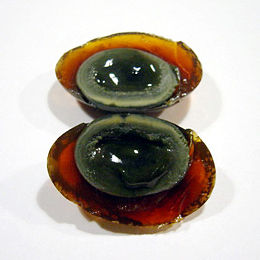It's not fried/skewered/slightly-toasty/crispy scorpions. . .
It's not regurgitated bird's nest soup. . .
It'd definitely not Beef Pizzle (fo' shizzle!). . .
It's the
[insert dramatic, thunderous, booming, theatrical voice here]
1,000 year old egg!
Well, as it turns out, the century egg is a "side-dish" (sorry, not a full meal folks) that is made by preserving duck, quail, or chicken eggs in a mixture of clay, ash, salt, charcoal, lime, and rice hulls. If there are any potters out there, you'll know that a few of those ingredients are primary components of glaze. The preserved egg pickles in this caustic mixture for many weeks to several months.
The chemical agent that "transforms" the egg is severely alkaline in nature, which eventually raises the interior pH to 12+ -- YIKES!
It is a dish with multiple layers of complex flavors. . . and smells like horse urine.
P.S. The recipe I viewed called for "ash of charcoal from a fireplace. . ." This egg is practically radioactive, so I'm betting on the fact that if I consume one during my time abroad I will most definitely return with super-mutant powers.



No comments:
Post a Comment